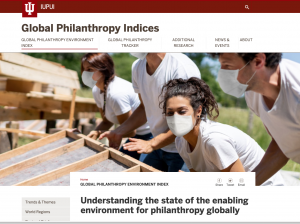People Still Give To People, Although Methods Change

Methods and inspiration for giving to civil society have changed rapidly. Donors in more economically developed nations increasingly use digital avenues. Cash remains king in the less developed economies and giving is improving.

Those are two of the trends cited in a new research series from the Indiana University Lilly Family School of Philanthropy at IUPUI called Digital for Good: A Global Study on Emerging Ways of Giving. The series will focus on how innovative giving methods such as mobile giving, crowdfunding, online volunteering, social impact initiatives and others are shaping giving in various countries.
The series builds on the school’s Global Philanthropy Environment Index and Global Philanthropy Tracker. The school will release it in phases during the next five months and feature profiles of eight diverse countries, beginning with analyses of giving trends in the United Kingdom and case studies of non-traditional ways of giving in Brazil. Profiles of China, India, Kenya, Singapore, South Africa and South Korea will follow. For each country, the research team collaborated with in-country partner organizations or individual experts to identify specific trends, shape data collection, and develop report findings. The study series is based on research funded by the Bill & Melinda Gates Foundation.
“Expanding on our global philanthropy research by introducing these studies allows us to better understand philanthropy’s ever-evolving trends and to examine them in countries with varied philanthropic landscapes,” said Una Osili, Ph.D., Associate Dean for Research and International Programs at the school. “By identifying and understanding emerging ways in which people are giving, we can equip leaders of charitable organizations to better secure, shape and deliver much-needed aid and relief.”
A key finding in the United Kingdom report is that while digital giving has increased as a percentage of all individual philanthropy, the human touch is still vital to securing the gift. “Whilst charitable funds can now be raised digitally even when engaging in-person (e.g., via tapping on a card reader or phone), it is human interaction that sits behind the donation. In-person requests for donations from peers also seem to be on par with interactions on social media,” according to the report’s authors.
Access to MinistryWatch content is free. However, we hope you will support our work with your prayers and financial gifts. To make a donation, click here.
Research by the Charities Aid Foundation (CAF) shows that a large decline in cash giving during the UK’s first pandemic lockdown in March and April of 2020 was at least partly offset by an upswing in digital giving, according to the authors. “Donating to a charity via a website or app increased from 20 percent of total giving in 2019 to 28 percent in 2020, whilst the proportion of giving via cash fell dramatically from 51 percent in 2019 to 38 percent in 2020 (CAF, 2021a),” according to the authors.
Adjustments are needed. A CAF poll conducted in August 2021 showed that just fewer than half (48%) of those polled agreed that the pandemic had permanently changed fundraising. Just more than half (52%) said that they planned to engage more in digital campaigns via apps, websites, or social media during the next 12 months.
Of those surveyed between May and July 2021, respondents who gave online during the previous 12 months mostly either did so via a third-party website such as JustGiving or Virgin Money Giving or directly via a charity’s website. Slightly more than one-fifth (21%) of these donors had given via a crowdfunding page during the previous 12 months with slightly fewer donors giving via payment services such as PayPal or Venmo (18%).
However, there are mixed opinions regarding the extent to which in-person giving can be replaced by digital interaction, according to the authors. Roughly 3 in 10 charity officials (28%) said digital approaches had been an effective substitute for in-person fundraising, while a similar proportion (31%) disagreed.
In Brazil, the social sector is starting to get more footing and people are moving away from expectations that government will handle everything. According to researchers, innovative giving vehicles can strengthen a culture of giving.
Newer approaches to giving are taking hold quickly in Brazil, according to the researchers. These include donating through rounding-up for a charity at checkout, crowdfunding, and social impact publishing, practices which all encourage smaller, more frequent donations that accommodate charitable contributions on modest household budgets.
“The three initiatives shared in this report highlight innovative ways that people are engaging in philanthropy in Brazil over recent years. Interestingly, these models are not digitally based; they evolved with no digital component, but digital will now contribute to their growth and expansion, and we hope they will inspire more ideas to promote philanthropy,” said Luisa Lima, communications manager at the Institute for the Development of Social Investment (IDIS), the Brazilian organization that conducted this research.
The most successful initiatives prioritized transparency and accountability in giving. Charitable organizations in Brazil face distrust or skepticism from donors about the use and impact of their donation. New giving initiatives that emphasize transparency and accountability can create more comfort for all donors with the nonprofit sector overall and can invite everyday donors to actively participate in a more inclusive civil sector.
“Transparency and accountability are crucial to the development of philanthropy in Brazil,” Lima added. “Although Brazilians are empathetic and supportive, there is an underlying attitude of distrust toward institutions that receive donations. Transparency is central to shifting these attitudes and building renewed trust within the philanthropic environment.”
This article was originally published by The NonProfit Times. It is reprinted with permission.



